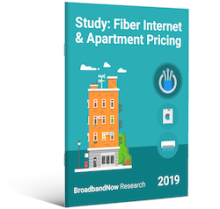Study: Apartment Renters Consider High-Speed Internet Access a Must-Have; Nearly Half Would Pay More for Fiber
When a renter looks for their next apartment, each weighs various amenities according to their own needs. In a recent study released by BroadbandNow, for almost 39 percent of survey respondents high-speed Internet access came in as a “must-have” feature.
Cleaning and Connecting Most Important
The survey sought opinions from almost 5,800 apartment dwellers, who ranked high-speed Internet access on par with a dishwasher, but below an in-unit laundry. Covered parking, a fitness center, and access to a pool came in well below convenient laundry and fast connectivity.
Renters who already have access to fiber connections were more likely to choose high-quality Internet access as a “must have” according to the survey. Only about 7.5 percent of those who responded to the survey connect with fiber and most rely on fixed wireless, about 35 percent. Current fiber subscribers are also the most likely to feel that their Internet access speeds are “good” or “very good” — a whopping 75 percent.
Approximately half of respondents said they would pay more for a place where they can access fiber. When considering rent, those who already have fiber, 35 present that said that they would be willing to pay an additional $50 per month in order to continue to use fiber for Internet access. About 17 percent of those who do not use a fiber connection, about 17 percent, said they would be willing to pay the extra $50 per month.
Landlords Take Note
Real estate experts have documented the benefits of fiber optic Internet access on both single-family homes and multi-dwelling units (MDUs). At the end of 2016, the FTTH Council (now the Fiber Broadband Association), created an infographic to help visualize the opportunity fiber creates for MDU landlords and building owners.
Based on research from RVA, LLC, American and Canadian renters are willing to pay $80 per month more on a $1,000 per month unit that has FTTH. Like the BroadbandNow research, RVA surveyed renters for their opinions.









